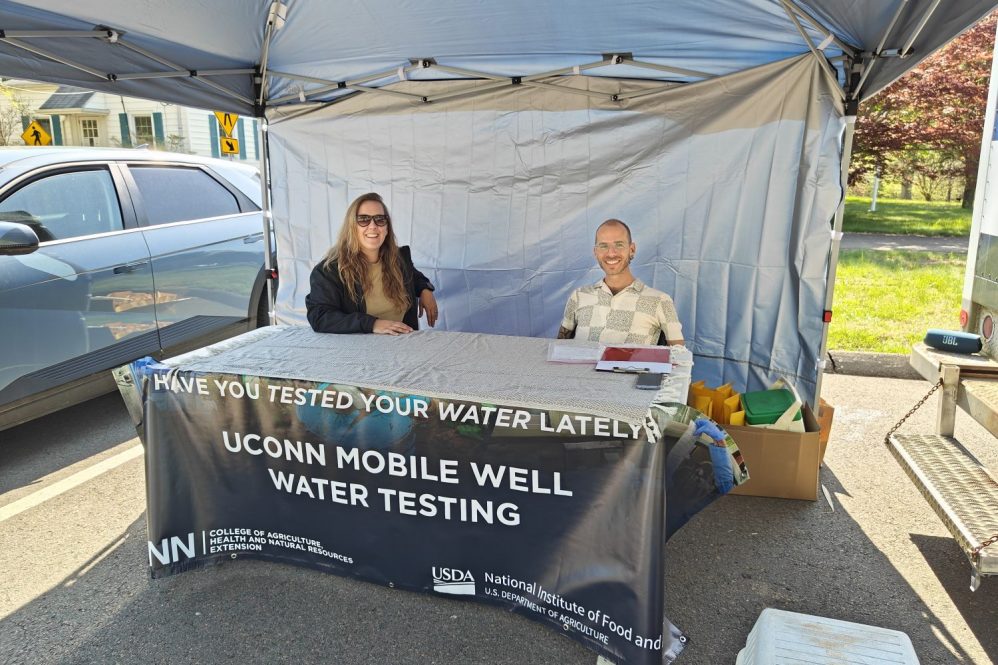When a Connecticut mother brought her two sons to yet another doctor’s appointment for their persistent stomach troubles, clean water wasn’t on her mind. They had tried diet changes, new recipes, and different medications, nothing worked.
Then she learned about UConn Extension’s low-cost well water testing program. The results came back quickly: coliform bacteria. Those results helped the family take action.
“After we treated our well to get rid of the coliform, all three of us got better within days! It’s made a big difference to us,” she says.
Her story is one of hundreds across the state. It’s also a reminder that water connects everything: our health, farms, food, and environment, and protecting it requires more than just one solution.
“UConn Extension works statewide to provide science-based solutions to community challenges. Our programs in well water testing, land use planning, human health, and food safety work together to help residents, municipalities, and organizations protect water quality and, in turn, safeguard the health of our people, farms, and ecosystems,” says Amy Harder, associate dean and associate director for UConn Extension.
From Wells to Watersheds
The Connecticut Institute of Water Resources (CT IWR) offers well water testing for residents across the state who rely on private wells. Mike Dietz, extension educator and CT IWR director, leads the program, with critical support from extension staff Alec Janis.
“Even if your water tastes and smells fine, that doesn’t always mean that it is safe to drink. The burden falls on the homeowner to make sure that their water is safe for their family,” Dietz says.
Private wells supply drinking water to nearly one in four Connecticut residents. UConn Extension makes testing accessible, especially in rural areas, and educates homeowners about common contaminants like arsenic, uranium, nitrates, lead, and bacteria. These substances can lead to chronic illnesses, hinder child development, and pose serious risks to vulnerable populations. Recent changes to required testing in the state (the addition of arsenic, uranium and lead) make it even more important to test; if your well was constructed prior to 2022 your water has likely never been tested for these contaminants.
Clean water is a preventive health measure, but it’s also the foundation for safe food, healthy families, and sustainable farms, linking directly to other Extension programs focused on land use, agriculture, and food safety.
Land Use Shapes Water Quality
Clean water doesn’t start at the faucet: it begins upstream, in how we manage our land. The outreach-focused Center for Land Use Education and Research (CLEAR) provides support to communities about land use decisions that impact water quality through its NEMO (Nonpoint Education for Municipal Officials) and other Extension programs like CTECO and the Land Use Academy. The tools, training, research, and mapping resources provided by these programs help towns explore solutions to reduce threats to our water bodies and drinking water posed by stormwater runoff, erosion, and pollution. They help communities implement low-impact development and green stormwater infrastructure solutions like rain gardens, bioretention, and pervious surfaces that reduce pollution by replicating natural stormwater processes.
The bottom line is that informed land use decisions by communities and individuals can keep contaminants out of our water before they ever reach homes and farms. Farmers also play a key role, working with UConn Extension specialists on nutrient management plans, soil health, irrigation water testing and management plans, livestock watering, and dairy production. Each of these components on a farm helps to conserve water, improve water quality by preventing runoff and contamination, and create a healthier food supply. Because of these efforts, UConn Extension programs have led to:
- 68% increase in acres where farms adopted recommended water protection practices.
- 4,855 residents completed Extension programs on water quality, conservation, and environmental protection.
- 65% increase in households taking steps to protect their water supply.
The Next Chapter
When well water testing, land use planning, agriculture, food safety, and public health programs work together, the benefits multiply.
“We can create better and more holistic solutions to complex issues by bringing together the varied expertise we have within UConn Extension,” says Harder.
This collaborative approach means that a farmer’s irrigation water, a homeowner’s well, and a town’s watershed plan all support one another in keeping water clean. And in the face of climate change and development pressures, this collective impact is what will keep Connecticut’s streams, lakes, and drinking water safe for generations to come.
For the family who finally found relief after years of illness, safe water means health, stability, and peace of mind. For the thousands of Connecticut residents impacted by UConn Extension’s water programs, it means something even bigger: a resilient future built on the simple, powerful foundation of clean water.
Funding for the well water testing program is supported by the USDA National Institute of Food and Agriculture, Rural Health Safety and Education program, project #2022-04833 and UConn Extension’s Reaching All Communities fund. UConn Extension is part of the College of Agriculture, Health and Natural Resources and fulfills the land-grant mission of translating the university’s research for the public. UConn Extension’s statewide locations and programs help serve all 169 Connecticut municipalities.
Follow UConn CAHNR on social media



